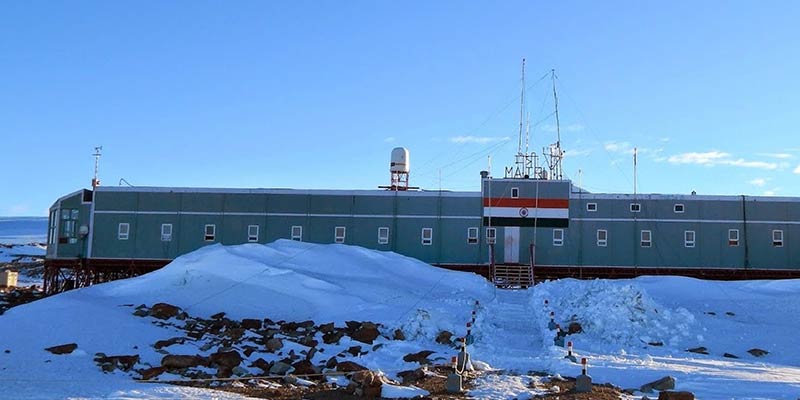- India
- Jul 23
Lok Sabha passes Indian Antarctic Bill, 2022
The Lok Sabha passed the Indian Antarctic Bill, 2022, which seeks to extend the application of domestic laws to research stations set up by India in the Antarctic region.
After the passage of the Bill, Indian laws will be applicable in the area occupied by Indian institutions and Indian personnel living in that continent.
India has two active research stations in the Antarctic — Maitri and Bharti — where scientists are involved in research.
India and Antarctica
• The Antarctic Treaty was signed on December 1, 1959 by 12 countries. It came into force on June 23, 1961, after its ratification. The Treaty’s objectives are to demilitarise Antarctica, establish it as a zone for peaceful research activities and set aside any disputes regarding territorial sovereignty, thereby ensuring international cooperation. The total number of Parties to the Treaty is now 54.
• India signed the Antarctic Treaty on August 19, 1983. India is one of the 29 Consultative Parties to the Antarctic Treaty.
• The Convention on the Conservation of Antarctic Marine Living Resources (CCAMLR) was signed in Canberra on May 20, 1980 to protect and preserve the Antarctic environment and, particularly, for the preservation and conservation of marine living resources in Antarctica.
• India ratified the CCAMLR on June 17, 1985.
• The Protocol on the Environmental Protection to the Antarctic Treaty (Madrid Protocol) was signed at Madrid on October 4, 1991, to strengthen the Antarctic Treaty system and for the development of a comprehensive regime for the protection of the Antarctic environment and dependent and associated ecosystems.
• India ratified the Madrid Protocol on January 14, 1998.
• India is also a member of the Council of Managers of National Antarctic Programme (COMNAP) and Scientific Committee of Antarctica Research (SCAR), which shows the significant position that India holds among the nations involved in Antarctic research.
• With an active research station Maitri in Schirmacher Oasis and a second station Bharati at Larsemann Hills, including Himadri station in the Arctic, India now belongs to the elite group of nations with multiple research stations within the Polar Regions.
Research base stations in Antarctica
• Since 1981, India has completed 40 scientific expeditions and built three permanent research base stations in Antarctica — Dakshin Gangotri (1983), Maitri (1988) and Bharati (2012).
• Dakshin Gangotri was established in 1983 over the Ice Shelf in the Central Dronning Maud Land region. The station was abandoned in 1990 as it got buried under snow.
• Currently, Maitri and Bharati are fully operational.
• Maitri has been operational since 1989 in the central part of Schirmacher Oasis, in Central Dronning Maudland region of East Antarctica. The Maitri station is functional round the year. It serves as a gateway to one of the largest mountain chains in central Dronning Maud land, located south of Schirmacher. It is an inland station about 100 km from the shore at an elevation of about 50 meters above sea level. It can support 25 persons in the main building during summer as well as winter and about 40 in the summer facility consisting of containerised living modules.
• Bharati is located between Thala Fjord & Quilty bay, east of Stornes Peninsula in Antarctica. The station was commissioned on March 18, 2012 to facilitate year-round scientific research activity by the Indian Antarctic programme.
What is the need for the Indian Antarctic Bill?
• India organises regular Antarctic expeditions and many persons from India visit Antarctica every year as tourists.
• The coordination and management of scientific research in Antarctica is implemented by the National Centre for Polar and Ocean Research, Goa, an autonomous research Institute under the Ministry of Earth Sciences.
• There is growing concern over preserving the pristine Antarctic environment and ocean around Antarctica from exploitation of marine living resources and human presence in Antarctica.
• In the future, the private ship and aviation industry will also start operations and promote tourism and fishing in Antarctica, which needs to be regulated.
• The continuing and growing presence of Indian scientists in Antarctica warrants a domestic legislation on Antarctica consistent with its obligations as a member of the Antarctic Treaty.
The Bill proposes to:
• Extend the application of domestic laws to research stations set up by India in the Antarctic region.
• Prohibit Indian expedition to Antarctica or carrying of certain activities in Antarctica without a permit or the written authorisation of another Party to the Protocol.
• Establish a Committee to be called the Committee on Antarctic Governance and Environmental Protection to regulate Indian Antarctic expedition and to exercise powers conferred on and perform the functions assigned to it.
• Provide for the constitution of the fund to be called the Antarctic fund which shall be applied towards the welfare of Antarctic research work and protection of the Antarctic environment.
Manorama Yearbook app is now available on Google Play Store and iOS App Store


